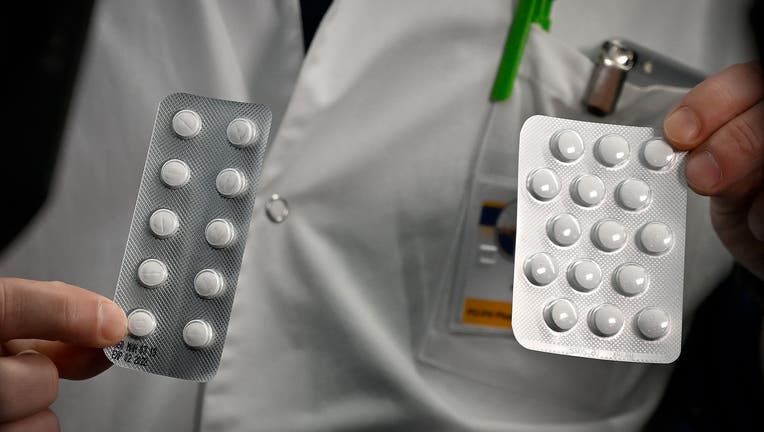Lupus community's concerns with hydroxychloroquine being used to treat COVID-19

Medical staff shows on February 26, 2020 at the IHU Mediterranee Infection Institute in Marseille, packets of a Nivaquine, tablets containing chloroquine and Plaqueril, tablets containing hydroxychloroquine, drugs that has shown signs of effectivenes (Gerard Julien/AFP / Getty Images)
(FOX 9) - According to the Centers for Disease Control, the drug hydroxychloroquine, a drug typically used to treat people with lupus or rheumatoid arthritis, is being used to treat COVID-19 leading to some concerns about a possible shortage.
In late March the leading scientist for the Food and Drug Administration sent out this letter authorizing the use of hydroxychloroquine, commonly known as Plaquenil, in the treatment of COVID-19 and allows the release of the drug from the national stockpile.

Concerns over shortage of lupus, arthritis medication being used to treat COVID-19
According to the Centers for Disease Control, the drug hydroxychloroquine, a drug typically used to treat people with lupus or rheumatoid arthritis, is being used to treat COVID-19 leading to some concerns about a possible shortage.
“Based upon limited in-vitro and anecdotal clinical data in case series, chloroquine phosphate and hydroxychloroquine sulfate are currently recommended for treatment of hospitalized COVID-19 patients in several countries, and a number of national guidelines report incorporating recommendations regarding use of chloroquine phosphate or hydroxychloroquine sulfate in the setting of COVID-19.”
Shortly after the letter from the FDA was released, the Lupus Foundation of America sent out this letter voicing their concerns over access to the drug for patients who need it to prevent sometimes fatal flare-ups from lupus.
“We are concerned that increased demand for these drugs attributed to COVID-19 has exacerbated their already limited availability for patients who rely on them to meet their medical needs. Therefore, we urge you to work with us and the broader health care community to help ensure continued availability of these drugs for the patients who are maintained on them to avoid disability, illness and even early death.”
Sarah Derr, the Executive Director of the Minnesota Pharmacists Association says Minnesota is not seeing a shortage of hydroxychloroquine but some other states are. She says the Minnesota Board of Pharmacy has put some recommendations in place to help prevent a shortage here. That includes considering how much of the drug to give to a patient who is using it to treat COVID-19.
“I’ve been on this medication for years. I went off this medication (at the recommendation of my doctor) just to see what would happen and my kidneys started spilling protein and blood again. So I know that this medication is life saving and it’s keeping me in remission and my story is common amongst lupus patients,” Regan Birr, founder of the Lupus Research Foundation said.
Birr says she recently saw her normal 90-day prescription for hydroxychloroquine reduced to a 45-day prescription. She says, so far, pharmacists have told her she will have access to the drug but she says she and many others living with lupus rely on it to survive.
“It’s a huge concern that we may not be able to access this drug especially since it’s lifesaving for so many lupus patients,” Birr said.
Birr says because lupus is an immune disorder, it puts people living with it at higher risk for complications related to COVID-19. She says if someone with lupus were to have their access to hydroxychloroquine limited it could mean their organs start failing. If that person were to then contract coronavirus they would be at an even higher risk of death.
The University of Minnesota is currently running trials on using the drugs for coronavirus treatment.

